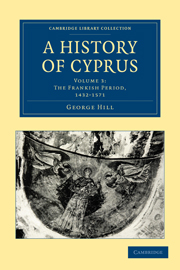Book contents
- Frontmatter
- Contents
- Volume III (1432–1571)
- Chapter IX John II, 1432–58
- Chapter X Charlotte and Louis of Savoy, 1458–64
- Chapter XI James II, 1464–73
- Chapter XII Catherine and James III. Catherine alone, 1473–89
- Chapter XIII Cyprus under Venice
- Chapter XIV The War of Cyprus. I. The Expedition of 1570
- Chapter XV The War of Cyprus. II. The Turkish Conquest
- Chapter XVI The Two Churches, 1220–1571
- Chapter XVII Literature and the Fine Arts
- Note on some Authorities
- Genealogy of the Lusignan Dynasty
- Addenda
- Index
- MEDIEVAL CYPRUS
- Plate section
Chapter XI - James II, 1464–73
Published online by Cambridge University Press: 07 June 2011
- Frontmatter
- Contents
- Volume III (1432–1571)
- Chapter IX John II, 1432–58
- Chapter X Charlotte and Louis of Savoy, 1458–64
- Chapter XI James II, 1464–73
- Chapter XII Catherine and James III. Catherine alone, 1473–89
- Chapter XIII Cyprus under Venice
- Chapter XIV The War of Cyprus. I. The Expedition of 1570
- Chapter XV The War of Cyprus. II. The Turkish Conquest
- Chapter XVI The Two Churches, 1220–1571
- Chapter XVII Literature and the Fine Arts
- Note on some Authorities
- Genealogy of the Lusignan Dynasty
- Addenda
- Index
- MEDIEVAL CYPRUS
- Plate section
Summary
The acquisition of Famagusta and Kerynia had established James firmly on the throne, and a great number of the Cypriotes who had so far adhered to the cause of Charlotte, and had left the island, now began to return. We have already more than once observed that James knew when it was politic to forgive his enemies; indeed his impulsive nature caused him occasionally to be too ready to do so. Those who were now reconciled to him were generously treated, being given in estates and revenues as much as they liked to ask for. The foreigners, Sicilians and Catalans especially, who had joined him, were of course liberally rewarded. A list has been preserved of nearly two hundred names of persons of all kinds to whom James gave offices, estates, houses, pensions, provisions in kind (such as corn or wine). These include his own mother, Dame Marietta of Patras; distinguished Cypriotes like Peter Davila, Peter Podocataro, Morphou de Grinier, Count of Roucha, James de Nores; Catalans and Sicilians like Muzio Costanzo, John Perez Fabregues, James Zaplana, Rizzo di Marino; churchmen and religious like Archbishop William Goneme; and Orientals like Tangrivardi and Cursuma. Of the oldest noble houses of Cyprus, Ibelin, Lusignan, Lases, Lodroni and de Nores, there are none of the first (who had indeed almost if not quite died out by this time) or fourth, few of the second, third and fifth.
- Type
- Chapter
- Information
- A History of Cyprus , pp. 621 - 656Publisher: Cambridge University PressPrint publication year: 2010First published in: 1948



